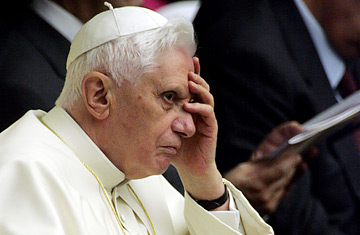Claim applause at Mass can be the highlight of the liturgy. What fresh liturgical abuse hell can they be applauding?
“Liturgy is at home in culture”
Cologne Cardinal Joachim Meisner was strictly against it, and other clergy were happy about applause during the service. Each community should decide for itself, says Paderborn liturgical scholar Stephan Wahle.
"If joy erupts spontaneously, you should definitely not stop it, but in this case you should see clapping as a great moment of the liturgy," he said in an interview with the portal katholisch.de (Friday).
“I find master plans or general liturgical guidelines that are generally intended for the universal church difficult. Because liturgy is always at home in the respective culture,” the theologian continued. For example, stamping one's feet is a given in the liturgy of African countries because it creates a connection to heaven and earth and thus includes the ancestors in the service, he explained.
Germans tend to be more at peace with themselves
“There are a wide variety of cultural motifs in how the liturgical event, the encounter with God and each other, is clearly expressed,” said Wahle. "Our German culture is more of a calm one. That's why we feel that worship should be something quiet and sublime. In our mentality, many see the sacred play of the liturgy as uplifting and calm, whereas other traditions and cultures do exactly the same thing Express that they show exuberant joy - for example by clapping."
However, there are one-off events, such as an inspiring sermon, that could "rightly" lead to a spontaneous expression such as applause. "But the opposite also exists: intense spiritual situations in the liturgy in which you simply cannot clap because everything is enveloped in spiritual silence. For example, when the congregation is so moved by a piece of music that there is initially a long silence."
Evaluate routine differently
In some communities it is almost an obligation to applaud the musicians or other participants at the end of the mass as a thank you. "In this case, clapping is no longer a spontaneous expression in the liturgical event, but a conventional act. If this becomes routine and you feel compelled to clap too, I can understand criticism of it," said Wahle. "But if at the end of the service the organist suddenly plays a magnificent organ piece, without anyone perhaps expecting it, and then applauds as a thank you for the coherence of the liturgical organ playing, in my view that is justified."











.jpeg)

Comments